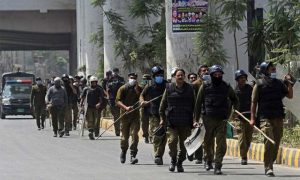Pakistan Imposes Section 144 in Rawalpindi Ahead of Powerful PTI Protest on Imran Khan’s Arrest Anniversary
One year after former Prime Minister Imran Khan was arrested, political tensions in Pakistan are once again climbing. With Pakistan Tehreek-e-Insaf (PTI) planning large-scale protests in Rawalpindi to mark the anniversary, authorities have responded by imposing Section 144 in the city — a move aimed at preventing public gatherings and maintaining law and order.
The decision reflects a mix of caution and urgency as the country continues to grapple with political divisions. For PTI supporters, August 5 is more than a date — it’s a symbol of what they view as injustice and political suppression. For the government and local authorities, it’s a potential flashpoint that must be controlled before things spiral out of hand.
What Section 144 Means for Rawalpindi
Section 144 of the Pakistan Penal Code is a legal provision that empowers local authorities to ban gatherings of more than four people. It is typically enforced in situations where there is fear of civil unrest or disturbance to public peace. In Rawalpindi, this measure comes as a pre-emptive step to control crowd movement and prevent potential clashes.
The Rawalpindi District Administration announced the imposition late Monday night, stating that the measure would be in effect for at least 7 days. This means PTI supporters could face arrests or legal action if they gather in public spaces for protests or rallies.
PTI Defiant Despite Restrictions
Despite the legal clampdown, PTI leaders remain defiant. Senior party members have released public statements urging supporters to show up peacefully and in large numbers to honor Imran Khan’s political journey and protest his continued legal troubles.
PTI spokesperson Rabia Azfar Nizami said, “This is not just about Imran Khan. It is about the democratic rights of every Pakistani citizen. We will continue our peaceful struggle regardless of restrictions.”
Social media has also played a key role in mobilizing support. Hashtags like #ReleaseImranKhan and #JusticeForKhan have been trending, with thousands of PTI supporters sharing memories from last year’s arrest and calling for a united presence at protest sites.
The Ghost of May 9 Still Looms
The government’s decision to impose Section 144 also stems from bitter memories of May 9, 2023, when protests over Imran Khan’s initial arrest led to violence and widespread damage to public property. That day marked a turning point in the country’s political landscape and led to the crackdown on PTI that continues to this day.

Authorities are determined to avoid a repeat of that chaos. Police presence has already increased in and around Rawalpindi with checkpoints and barricades set up across key locations. Security forces have been placed on high alert to respond quickly to any signs of unrest.
Public Reaction: A Mix of Concern and Resignation
Many citizens in Rawalpindi are caught in the middle — aware of the political tension but focused on getting through their daily lives. Shopkeepers near Liaquat Bagh and Saddar have expressed concern about safety and loss of business during times of political protests.
“I support democracy but I also need to earn my living,” said Shahid, a local vendor in Raja Bazaar. “Every time there’s a protest or lockdown we suffer. There has to be a better way.”
At the same time, some residents sympathize with PTI’s right to protest peacefully. “People should be allowed to express themselves without fear,” said 24-year-old university student Areeba. “It’s a basic part of any free society.”
Looking Ahead: A Day of Decisions
As Rawalpindi braces for the protest and possible fallout, much depends on how both sides — the government and PTI — choose to act. Will this be a day of peaceful remembrance or yet another chapter in Pakistan’s deepening political crisis?

Either way, August 5 stands as a powerful reminder of the sharp divides that still define the nation’s politics — and the challenges ahead in bridging them.
Also read: https://channel6network.com/e20-petrol-proves-efficient-engine-friendly/

